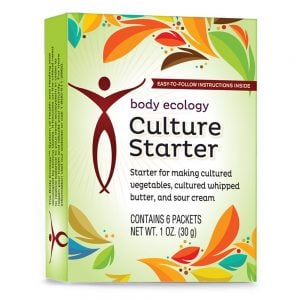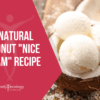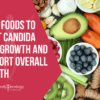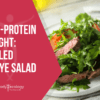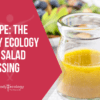Colicky Baby Remedy? Good Gut Bacteria Could Prevent Colic
There are few times more worrisome and frustrating than when your baby has colic. After hours of non-stop crying and visits to the doctor that don’t provide you with a surefire remedy, you feel helpless and don’t know where to turn. Your baby’s pain becomes painful for you too.
What Is Colic?
It may seem impossible to calm your crying baby when he has colic, but fermented foods could help. Your baby’s gut may be missing beneficial bacteria, found in the juice of cultured vegetables made from the Veggie Culture Starter.
Any parent who has had a baby with colic knows what a nightmare it can be. While it’s normal for a newborn to cry, an estimated 15 to 25 percent of seemingly healthy babies often cry inconsolably.1 A doctor may diagnose colic based on a behavioral observation — known in pediatric circles as the “rule of threes” and also called the Wessel Criteria, created by the pediatrician Dr. Morris Wessel 40 years ago.2 A baby with colic may begin crying frequently after the age of 3 weeks, usually later in the day. Crying that lasts for more than three hours a day and occurs on more than three days a week for more than three consecutive weeks is considered colic. Colic is said to peak at ages 6 to 8 weeks and may stop by the time a baby is 3 months old.
Doctors insist that a colicky baby isn’t an unhealthy baby, but no one has pinpointed an exact cause of a colicky baby’s discomfort yet. A number of experts believe that colic could be related to gas or indigestion, while others suggest milk allergies, lactose intolerance, or an immature gut. Most doctors try to help parents address colic by learning how to manage the crying and make a baby more comfortable, while the underlying gut health connection is completely overlooked.
Probiotics for Colic: Good Bacteria Can Soothe a Baby’s Gut
Although the exact cause of colic has long been regarded as something of a mystery in the mainstream medical community, research confirms what we at Body Ecology have been teaching for some time: that a lack of beneficial gut bacteria could be the cause of your colicky baby’s blues.
In a study performed by the University of Texas Health Science Center at Houston, babies with more types of gut bacteria were less likely to experience colic.3,4 More specifically, every colicky baby in the study had a smaller variety of gut bacteria, as well as one particular strain called Klebsiella that is believed to be the culprit behind all of the crying!
Since colic is such a hot topic among concerned parents who can’t find any clear-cut solutions, research on the infant condition is extensive. A 2012 study, conducted by Dr. Abdelrazak Mansour Ali from Cairo’s Al-Azhar University, linked infant colic with H.pylori — a harmful bacterium associated with over 80 percent of duodenal and gastric ulcers.5 While British Medical Journal researchers stated that probiotics do not help babies with colic in 2014, another study conducted later in the year by the Motherisk Program at the Hospital for Sick Children in Canada, published online in The Journal of Pediatrics, argued that probiotics may “significantly reduce colic” in North American infants.6,7
As Dr. Gideon Koren, Founding Director of Motherisk and Senior Scientist at SickKids, explained, “It is critical to evaluate natural products, such as probiotics, with the same scientific rigor used for medicinal drugs. Using these rigorous methods, we have shown that this probiotic can help infants.”
In another 2014 study published in JAMA Pediatrics, Dr. Flavia Indrio, lead study author and pediatric gastroenterologist at Aldo Moro University of Bari, Italy, said, “In Europe, probiotics are widely used to treat colic.” After examining 500 newborns given either probiotics or a placebo, Dr. Indrio and her team concluded that babies who were given probiotics for the first three months of life had fewer cases of constipation, acid reflux, and colic.8
As you can see, it’s important for your baby to have a healthy inner ecosystem, one in which his intestines have the ideal balance of beneficial microflora (good bacteria and beneficial yeast) as opposed to harmful and colic-inducing strains, such as Klebsiella and H.pylori. This presence of healthy gut bacteria is crucial if he’s going to develop a strong immune system that can fight off a slew of infant and childhood diseases, including colds, viruses, earaches, tummy aches, and even colic.
How to Relieve Colic the Body Ecology Way
You will be happy to know that there are a number of ways you can ensure that your baby’s body will be home to the kind of beneficial gut bacteria that will steer him clear of colic, keep him calm, and set him on the road to optimum health.
Here’s where to begin:
- Start early. Tiny spoonfuls of the juice of cultured vegetables (or a dropperful) can be given shortly after birth, away from his milk feedings. Another simple way to introduce healthy gut flora is to dilute one of our fermented drinks, such as our CocoBiotic, with filtered water and gradually give it to your baby a teaspoon or a dropperful at a time, again away from feedings.
- Nourish yourself.You are his sole source of nourishment, after all — whether he’s bottle-fed or breastfed, which is preferable. In fact, even before you have given birth, a mother’s body serves as a template for what her baby will become, and that is why it is essential for you to create your own healthy inner ecosystem. The bacteria in your own gut will be the bacteria given to your baby at birth.9 That bacteria “translocates” to your birth canal to transfer to your baby. Luckily, it is much simpler to incorporate fermented foods into your diet than you probably realize. Consider creating a delicious Young Coconut Kefir using our Kefir Starter Kit. It’s a satisfying, refreshing, and easily made tonic that will help you and your baby digest food, absorb more nutrients, and establish strong, healthy microflora in your intestines.
- Support your family. By adding fermented foods and drinks to your family’s diet, you will be establishing positive dietary values for your whole family! When your baby grows up in a home where fermented foods are important, he will pass this heritage on to his own family someday. In a simple but profound way, you will be making a difference in the world.
Here is a testimonial from a happy Body Ecology parent who put these principles into practice:
“I have an autistic 5-year-old, and the Body Ecology principles have done wonders for him! He got potty-trained 1 1/2 months after I started him on the diet hard on, and he talks, interacts, reacts, reads as a beginning second grader and does math as a high first grader, sits still and learns a half hour every day in a normal kindergarten. He comprehends so many things now. He understands he is sick in his tummy and therefore he needs to eat his medicine/supplements and drink his Young Coconut Kefir. He was only able to say nine words 10 months ago, wasn’t potty-trained, didn’t react at all — barely any eye contact, no sense of danger, and very moody. I’m so thankful for Donna Gates sharing her wisdom!”
Maria F., Facebook Fan Page
Whether your baby has colic or not, a strong immune system is one of the very best gifts you can give to your tiny newborn: the gift of a strong immune system and a healthy digestive system right from the start of his life.
What To Remember Most About This Article:
Colic, a condition marked by inconsolable crying that affects up to 25 percent of babies, can be overwhelming to a new parent. For starters, the medical community agrees that there isn’t a known cause of colic — meaning, there aren’t any real solutions to ease a baby’s discomfort and distress.
But when you dig a little deeper, you’ll find that research provides hope for calming a crying baby during the first three months when colic is most likely to occur. The simple, and often the most effective, solution is to strengthen your baby’s gut with a small, daily dose of probiotics. In 2014, Italian researchers discovered that babies given probiotics within the first three months of life had fewer instances of colic.
As a parent, this is wonderful news. You can reduce or even alleviate colic with three helpful tips:
- Start early. Nurture your baby’s inner ecosystem daily with small doses of probiotics, given away from feedings — found in the juice of cultured vegetables or from a diluted, ready-made probiotic beverage like CocoBiotic.
- Nourish yourself. Since a mother’s gut bacteria are passed on to her baby at birth, it’s critical to support your own inner ecology during pregnancy and beyond. Drinking Young Coconut Kefir daily is both refreshing and nourishing, providing that extra nutritional boost required throughout pregnancy and breastfeeding.
- Support your family. A family that enjoys fermented foods and drinks daily may be set up for a lifetime of robust health. Teaching your children the importance of gut health at a young age is one way to pass on a healthy heritage to your grandchildren.
- [product id=”200″]
- [product id=”1″]
- [product id=”3″]
REFERENCES:
- “Colic 101: What It Is and What to Do.” Parents Magazine.
- “Colic: Facts, Causes and Treatment – American Pregnancy Association.” American Pregnancy Association.
- Dessy, Mira. “Cure for colic?” Grains & More.
- “Bacteria May Be Connected to Colic.” S. News and World Report.
- Ali, Abdelrazak Mansour. “Helicobacter Pylori and Infantile Colic.” Arch Pediatr Adolesc Med Archives of Pediatrics & Adolescent Medicine (2012).
- “Probiotics Do Not Help Infants with Colic.” EurekAlert!
- “Probiotics May Significantly Reduce Colic in North American Infants: Motherisk Study.” ca.
- Flavia Indrio, M.D., department of pediatrics, Aldo Moro University of Bari, Italy; Bruno Chumpitazi, M.D., M.P.H., pediatric gastroenterologist, Baylor College of Medicine, Houston; William Muinos, M.D., co-director, division of gastroenterology, Miami Children’s Hospital, Florida; Jan. 13, 2014, JAMA Pediatrics.
- Jiménez, Esther, María L. Marín, Rocío Martín, Juan M. Odriozola, Mónica Olivares, Jordi Xaus, Leonides Fernández, and Juan M. Rodríguez. “Is Meconium from Healthy Newborns Actually Sterile?” Research in Microbiology: 187-93. Print.

